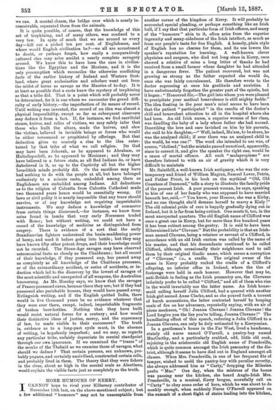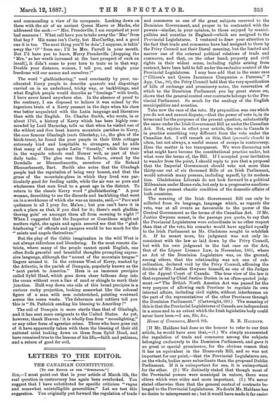- MORE RUMOURS OF KERRY.
ICANNOT hope to rival your Killarney contributor of November 13th last, on the above-mentioned subject ; but a few additional " humours " may not be unacceptable from
another corner of the kingdom of Kerry. It will probably be accounted special pleading, or perhaps something like an Irish ball, if I say that that particular form of Irish offence, and many of the " humours " akin to it, often arise from the superior ingenuity and many-sidedness of the Irish intellect, as much as from our people's taste for fine English. A homely, plain style of English has no charms for them, and its use lowers the speaker's reputation for learning. A well-known clever physician and surgeon, who died not long since in Kerry, once showed a relative of mine a long letter of thanks he had received from a small farmer whose daughter he had attended in a dangerous fever. The patient recovered, but was not growing as strong as the father expected she would do, once she was fairly convalescent. He therefore wrote to the doctor expressing at once his gratitude and anxieties. I have unfortunately forgotten the greater part of the epistle, but it began t " Honoured Sir,—The girl into whom you were pleased to precipitate your medical benevolence is still mighty feeble." The idea floating in the poor man's mind seems to have been that the patient " participated " in the results of the doctor's skill and benevolent attention to all in the hospital where she had been. An old Irish nurse, a superior woman of her class, was dandling the baby of a lady whose father she had nursed. Describing the love and care lavished on him by his parents, she said to his daughter,—" Well, indeed, Ma'am, to be shure, he was the analysed child; if ever there was an analysed child in the world, he was one !" The word she intended to use was, of course, "idolised;" but the mistake passed unnoticed, apparently, since to correct it, and give the speaker the right one, would be a cause of mortal offence. All such " malapropisms " are therefore listened to with an air of gravity which it is very difficult to maintain
Mr. Sainthill, a well-known Irish antiquary, who was the con- temporary and friend of William Magian, Samuel Lover, Petrie, and Father Prout, in his book on the mythical "Old, Old Countess of Desmond," tells a story to illustrate the family pride of the poorest Irish. A poor peasant woman, he says, speaking to him of one of her family who was supposed to have married beneath her, said,—" You know, your Honour, she was a Kirby, and no one thought she'd demane herself to marry a Kiely !" The old colonial pride of race is happily gradually dying out in Ireland, but it is far from being extinct. One meets it, too, in the most unexpected quarters. The old English name of Clifford was once a great one in Kerry, but for more than five hundred years it has been extinct among the gentry. It is said to have been Hibernicised into" Clavane." But the probability is that an Irish- man named Cluvane, being a retainer or servant of a Clifford, in accordance with an old Irish custom was called by the name of his master, and that his descendants continued to be called Clifford, although occasionally their neighbours used to call them by their original Gaelic name, which seems a corruption of " Clievane," i.e., a cradle. The original owner of the name in Kerry probably rocked the cradle of a Clifford's offspring, no inferior office in Ireland, where the ties of fosterage were held in such honour. However that may be, anti-British in feeling as the Irish peasantry are, the Clnvanes infinitely prefer to be called " Clifford," and all of them who rise in the world invariably use the latter name. An Irish house- maid calling herself Julia Clifford, had a quarrel with another Irish girl named Anne Clarke, and as she poured forth a torrent of harsh accusations, the latter contented herself by heaping coals of fire on her adversary, repeatedly saying, with an air of pious meekness, " Oh! Joanna Cluvane ! Joanna Cluvane! the Lord forgive you the lies you're telling, Joanna Cluvane !" The humiliating effect of this speech, reducing a Julia Clifford to a Joanna Cluvane, can only be duly estimated by a Kerryonian.
In a gentleman's house in the Far West, lived a handsome, stately old nurse named O'Farrell, a pantry-boy named MacCarthy, and a particularly crabbed, odd, little old cook, rejoicing in the aristocratic old English name of Prendeville, which is quite common amongst the Irish peasantry of the dis- trict, although it seems to have died out in England amongst all classes. When Mrs. Prendeville, in one of her frequent fits of temper, wished to scold the pantry-boy with peculiar severity, she always addressed him as " Carty," dropping the Milesian prefix " Mac." One day, when the mistress of the house was passing near the kitchen, she heard Anglo-Irish Mrs. Prendeville, in a musical, Kerry brogue, scornfully call on " Carty " to obey some order of hers, which he was about to do meekly enough, when suddenly Nurse O'Farrell appeared on the summit of a short flight of stairs leading into the kitchen, and commanding a view of its occupants. Looking down on them with the air of an ancient Queen Maeve or Mocha, she addressed the cook :—" Mrs. Prendeville, I am surprised at your had manners ! What call have you to take away the ' Mac' from that boy ? His name isn't Carty, but MacCarthy, and a good one it is too. The next thing you'll be doin, I suppose, is takin' away the ' 0" from me ; I'll be Mrs. Farrell in your mouth. But I'd. have you to know, Norry Prendeville [dropping the ' Mrs.' ae her wrath increased at the bare prospect of such an insult], it didn't come to your turn to trate us in that way. Double your distance, woman, I tell you, and single your freedoms wid our names and ourselves !"
The word " gladhiathoring," used constantly by poor, un- educated Kerry people to describe quarrels and disputings carried on in an underhand, tricky way, or backbitings, and what English people would describe as "fencings " with truth, I have never heard anywhere else. In the absence of proof to the contrary, I am disposed to believe it was coined by the ingenious brain of a Kerry peasant in the days when his class was better acquainted with the Latin language and literature than with the English. Dr. Charles Smith, who wrote, in or about 1745, a history of Kerry which has been highly com- mended by Lord Macaulay, tells us that when he visited one of the wildest and then least known mountain parishes in Kerry, the now famous Glanbegh (recto Glanbehy, i.e., the glen of the birch-trees), he found the poor people in their little cottages extremely kind and hospitable to strangers, and he adds that many of them spoke Latin " fluently," while their sons in the wayside schools read Homer well, as part of their daily tasks. The glen was then, I believe, owned by the Dowdalls or Blennerhassette, ancestors of Sir Roland Blennerhassett, Bart. Smith also notes that the Glanbegh people had the reputation of being very honest, and that the grass of the mountain-glens in which they lived was par- ticularly good for feeding cattle, while the air was so pure and wholesome that men lived to a great age in the district. To return to the classic Kerry word " gladhiathoring." A. poor woman, describing to me the discords and backbiting that went on in a workhouse of which she was an inmate, Pace and quitenese is all I pray for, Ma'am ; but you can't have it in such a place as that, if you died for it; there's such gladhia- thoring goin' on amongst them all from morning to night !" 'When I suggested that the Inspector or Guardians might set matters right, she again and again assured me that the " glad- liathoring " of officials and paupers would be too mach for the ." saints and angels theirselves."
But the play of the Celtic imagination in the wild West is not always ridiculous and blundering. In the most remote die- tricts, where many of the people cannot speak English, one often finds graceful and beautiful thoughts prompting expres- sive language, although the "accent of the mountain tongue" lingers around it. In the extreme West of Kerry, washed by the Atlantic, is the parish of Dunquin, popularly known as the next parish to America." Here is an immense precipice called Sybil Head, which goes down sheer fathoms deep into the ocean without even a line of sand or shingle to mark their junction. Half-way down one side of this broad precipice is a curious rocky projection, looking somewhat like the colossal figure of a man with arm outstretched, pointing westward across the ocean waste. The fishermen and cottiere tell you this is " St. Pathrick sending his blessing to Amerikay !"
The soil of Dunquin is more sterile than that of Glanbegh, .and it has sent more emigrants to the United States. As yet, however, thank Heaven ! it is wholly free from "moonlighting," or any other form of agrarian crime. Those who have gone out of it have apparently taken with them the blessing of their old national saint looking down on them from Sybil Head, and have remained true to the lessons of his life,—faith and patience, and a return of good for evil.



































 Previous page
Previous page